Women student-athletes, coaches share athletic experiences
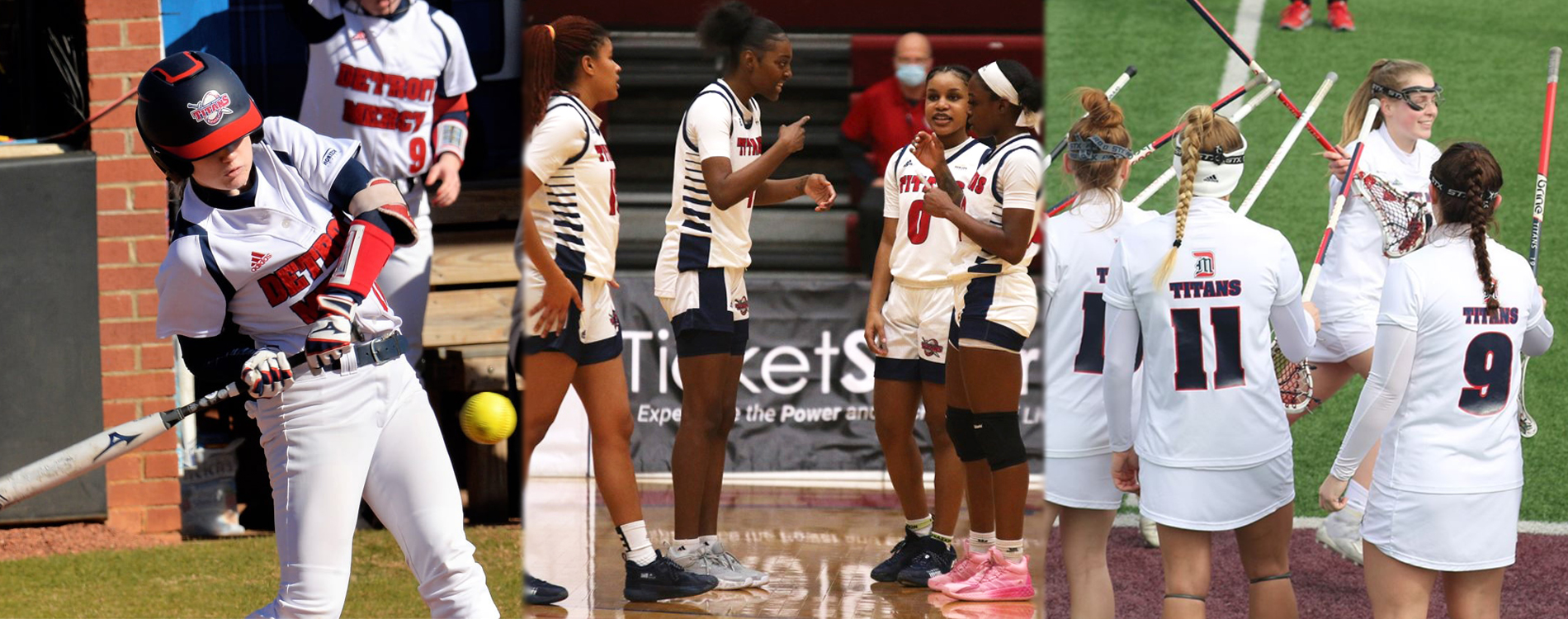
To honor Women’s History Month, University of Detroit Mercy’s Office of Marketing & Communications spoke to Titan student-athletes and coaches about their experiences in sports, which Title IX made possible. This year marks the 50th anniversary of the passage of that landmark legislation.
“As Congress debated the passage of the Education Amendments Act of 1972, one of its sponsoring senators argued that Title IX, which prohibits discrimination on the basis of sex in educational environments, represented an ‘effort to provide for the women of America something that is rightfully theirs—an equal chance.’ In the 50 years since the passage of Title IX, women have excelled in academic life, now earning more than half of the nation’s undergraduate, professional and doctoral degrees and constituting nearly half of full-time faculty,” said Megan Novell, interim Title IX coordinator and adjunct faculty at Detroit Mercy. “Women’s participation in intercollegiate athletics has increased sixfold in that time, and women athletes have been able to benefit from the determination, leadership and teamwork that participation in sports fosters and supports.”
Here’s what our Titan student-athletes and coaches had to say:
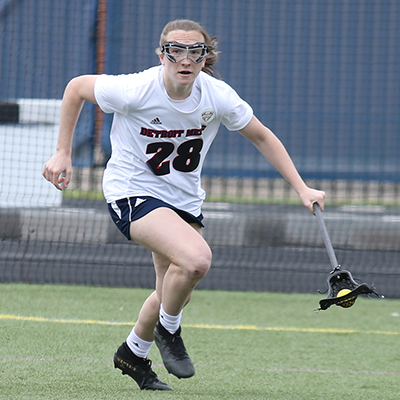 Kaileigh Nuessgen
Kaileigh Nuessgen
Year: Sophomore
Hometown: Beavercreek, Ohio
Major/Minor: Criminal Justice (accelerated 5-year)/Leadership and Literature
Expected graduation year: 2025
Sport: Women’s lacrosse
Why did you choose Detroit Mercy?
The academic and athletic opportunities that were available here, and then the environment. It was something I wanted to be a part of, a growing city.
How did you get involved in sports? How old were you? What sports did you play?
My older brother was always in sports and my family was just really big into sports. As soon as I could walk, I was doing something. It started with soccer and then I started wrestling in first grade and picked up lacrosse my freshman year of high school.
What has your experience as a student-athlete at Detroit Mercy been like?
I’d say very positive. Obviously last year with COVID and coming in as a freshman, it was definitely an adjustment to be made. But we did the best we could with what we had and what we could do. There’s obviously a lot of growing to be done everywhere, but I definitely enjoy the environment of college athletics.
How has participating in sports shaped your life experiences?
I think it taught me a lot about discipline and hard work. Especially with wrestling, I definitely faced a lot of difficulty being a female in a male-dominated sport. There were a lot of times where I was younger, people wouldn’t want to wrestle me because I was a girl. Just learning to work through that and continue to be underestimated in every match you step out on. It taught me a lot about pushing through that.
There weren’t a lot of girls to wrestle my freshman, sophomore or junior year, I didn’t really run into many. But my senior year, Ohio actually started the Ohio High School Wrestling Coaches Association state tournament for women’s wrestling, so I was able to, my senior year, compete in that against other females. I did a lot of girls tournaments when I was younger, but in high school, there weren’t a lot. It was co-ed. I was the only girl on my team, but I wrestled against guys all four years.
Who is a role model that you’ve had in sports?
That’s a good question. I can’t really think of a specific athlete because I kind of switch it up, but all the U.S. Women’s National Soccer Team players were pretty big growing up, because I was really big into soccer when I was younger. So just seeing them fight through a lot of adversity and stuff like that, that’s very inspiring. And there’s a couple female wrestlers that are cool to watch and cheer on in the Olympics.
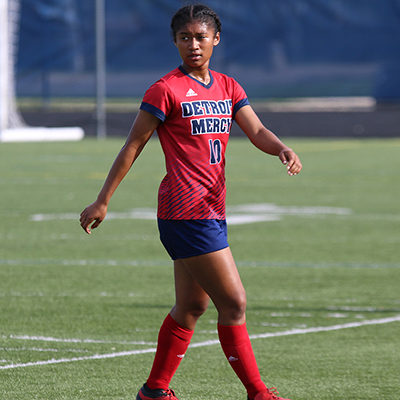 Hannah Alexis
Hannah Alexis
Year: Senior
Hometown: Toronto, Canada
Major: English and Psychology
Expected graduation year: 2022
Sport: Women’s soccer
Why did you choose Detroit Mercy?
It was a goal to play sports in the United States. I always wanted to move out when I was 18. Not for any particular reason. I do love traveling and trying new things. I went to school in Japan for a little bit when I was 15. So I thought, ‘Let's go to the States and see what it's about.’
How did you get involved with sports?
My parents put me in soccer when I was really young. I never had video games as a kid, so all I did was play with the neighborhood kids and just practice soccer at school, too. So all around, I got involved with sports because of my parents and because of my friends.
How old were you?
In a league or as part of a team, I think I started when I was 7. But just fooling around and hanging out with friends, that was like way earlier, ever since I could walk, I guess.
What sports did you play?
I don't know if people count this as a sport, but I used to do ballet when I was about 3. After that, I think I moved on to gymnastics. That's when I moved on to soccer. Other than that, I didn't play anything else.
What has your experience as a student-athlete at Detroit Mercy been like?
It's been an interesting experience. I definitely do like my teammates. I believe there could be a lot of improvements on the facilities and on the meal plans. I don't think I'm the only person who thinks that way. Overall, I like the sense of community that we have with the sports teams, especially because we go to a small school.
How has participating in sports shaped your life experiences?
I use it for job applications. When they ask you if you know anything about teamwork. I say, ‘Yeah, I played soccer my whole life.’
I’ve met a lot of new people that I would never expect to meet, that I definitely would not talk to under different circumstances.
Playing a sport is beneficial because it forces you to get outside of your comfort zone, think outside the box and you're really disciplined, too. You've got to follow these workouts. You've got to get up and be at practice on time. You've got to balance your homework and games, making sure you don't have any assignments due on the same day you have games.
Overall I think it makes you a well-rounded person and it makes you ready for life and for the workplace.
Who is a role model that you’ve had in sports?
I had an athletic trainer when I was 15. He is still technically my trainer now, but I live in the States and he lives in Canada, so I don't visit him often. But I do look up to him because he is 40 years old, I think, and he's still in extremely good shape. He trains Olympic athletes and NCAA Division I athletes. He's one of the few trainers who's very knowledgeable about what he does, but he's still always willing to learn more. Just because he has his degree or a certificate or whatever, it doesn't mean that he just stops there. He's always hungry for more information, and I look up to him because that's the type of person I want to be. I want to just keep growing, even as I age.
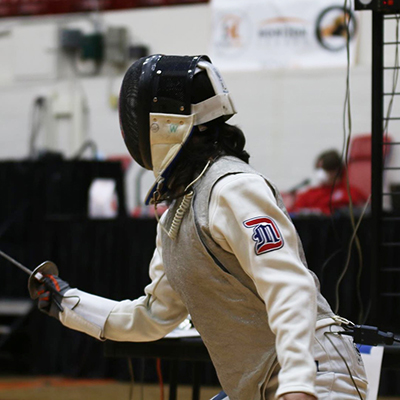 Isabella Cole
Isabella Cole
Year: Freshman
Hometown: Shelby Township, Mich.
Major: Biology
Expected graduation year: 2025
Sport: Women’s fencing
Why did you choose Detroit Mercy?
I liked the size of the school and the programs. Detroit Mercy offered the opportunity for networking at the school by meeting professors, as well as the chance to do undergraduate research.
How did you get involved in sports? How old were you? What sports did you play?
I guess I’ve always liked doing sport, and I just continued to do them. I started seriously started playing sports at 11. I just started fencing, but I played golf and volleyball in high school.
What has your experience as a student-athlete at Detroit Mercy been like?
Definitely a little more stressful than I thought it was going to be to handle time management, since I’m a first-year student. It’s been an overall very positive experience. The people are the best part, especially my teammates. I’ve created some close bonds with them.
How has participating in sports shaped your life experiences?
I feel like it has definitely grown my confidence, and I also guess my creativity in a way. When you are in a game, it’s not always perfectly planned out. You have to adapt to whatever is going on in the game. In fencing, when you are on the strip and someone is pointing a blade at you, you have to read them in a split second to adjust.
Who is a role model that you’ve had in sports?
I’d have to say my high school golf coach. I wasn’t a huge golfer, I started in high school, and I was nervous about starting the sport. Since I played high-speed games like volleyball and basketball, just trying to get into a different mentality was great and my coach was really good at that.
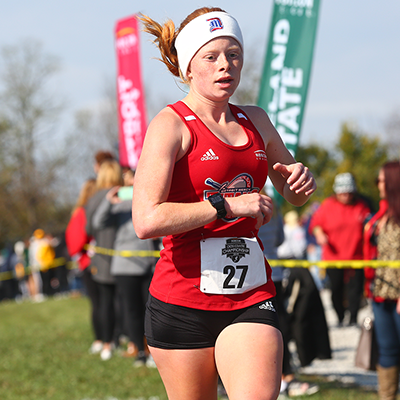 Kaitlin Murray
Kaitlin Murray
Year: Junior
Hometown: Redford, Mich.
Major: Biology
Expected grad year: 2023
Sport: Cross country and track and field
Why did you choose Detroit Mercy?
I chose to attend Detroit Mercy because of the small class sizes and I like the team atmosphere.
How did you get involved in sports? How old were you? What sports did you play?
At a very young age, I was involved in sports because my whole family runs and encourages us to be involved in sports. I was like 5 when I ran my first race and played soccer and danced. I did tap and ballet, I ran, of course, and I played soccer as well.
What has your experience as a student-athlete at Detroit Mercy been like?
My experience has been good. The team is very supportive, especially throughout COVID, and we’ve been able to have fun events, even when everything was canceled. I really enjoy how close the team is and the atmosphere here.
How has participating in sports shaped your life experiences?
I have always loved to move and be active. I’ve always loved being a part of something and being a part of a team. My life has always been better for it, and my family has always supported me and always wanted me to succeed at every sport that I tried.
Who is a role model that you’ve had in sports?
I’d say that my mom has been a great role model. She was also a runner and she was running all throughout my childhood. I just wanted to be as fast as her when I was younger.
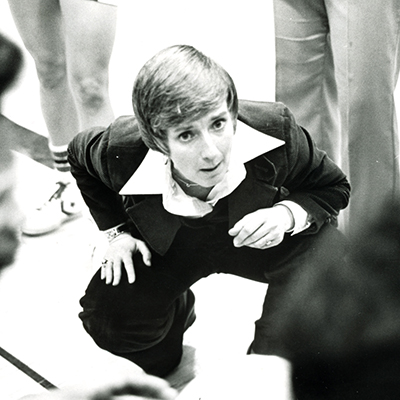 Sue (Kruszewski) Hardy ’64
Sue (Kruszewski) Hardy ’64
Hometown: Detroit
Major: Physical Education
Position: Head coach
Sport: Women’s Basketball, Softball
Record: 70-15 (three seasons, basketball)
Titan Athletics Hall of Fame: 2017
Sue (Kruszewski) Hardy was instrumental in the start of women’s athletics at Detroit Mercy. She coached the first women’s basketball team in 1977-78, helped start and coach the softball squad and also led the cheerleading program.
She’s seen the rise in women’s athletics over 50 years since the institution of Title IX in 1972. In 1973, prior to her career at Detroit Mercy, Hardy coached her Detroit Dominican High School squad to the first Class A state championship held for women’s basketball in Michigan.
How did you get involved in sports and basketball?
It was interesting how my career path was shaped. I had a kid come up to me one day in high school and say, ‘Congratulations for making the basketball team’ and I said, ‘What?’ I had never even tried out. The coach had picked kids out of the gym class. That’s how I started. I graduated and I got right into coaching.
After college at University of Detroit, I went into teaching at Dominican High School on the east side of Detroit. I taught physical education, biology and health education. I was there for 13 years and had the honor of having the first two Class A state championship teams in the state.
What brought you back to the University as a coach?
One day I got a phone call from Dick Vitale, who was the athletic director and coach of the men’s team at the University. He said to me, ‘I would like to start women’s athletics and the women’s program. What do I have to do to convince you to come here and coach for us?’
And I said, ‘Here’s how I would come and that’s if you treated us equal. Give us a locker room like the men’s program, 15 scholarships and money to recruit with,’ and he did that. There was no other athletic director in the nation, I believe, that was that supportive at that time. He was extremely supportive.
What was it like to help start athletics at Detroit Mercy, including seeing success right away with the women’s basketball program?
With the team itself, I did another very smart thing and I hired my assistant Lydia Sims, who was a star basketball player for the University of Michigan. That was a very important move to have her come in and help with the program. She was instrumental in knowing the kids in the city of Detroit. We were supportive of bringing in the city kids in to play basketball. Our team consisted of girls that came because they felt that they were going to get an education and they were going to be given a scholarship to play basketball.
Right away, within one year, we were seen around the nation because we were bringing in some of the top teams to play. We were ranked top 20 in the nation. Another thing that really helped us was that basketball was a big draw for the University. Vitale had a wonderful team and was such a motivator. We played doubleheaders with the men’s team. Fans would come to see us and stay to see another show with the men’s team. The stands were full. It was really exciting for both programs. Vitale was extremely supportive of our teams.
Can you reflect on the transformation of women’s athletics since the inception of Title IX, helping start athletics at Detroit Mercy and the strides that have been made now?
Sports were so fledging back then in 1972. I did play softball and volleyball and with basketball, back then it was half court, and then with Title IX coming in it moved to full court. The advantage I had coming in was that my high school was an all-girls school. We had total support; the whole school came to games. We had the same support from the athletic director. Catholic high schools were the strength back then because of the CYO. We were much stronger than the public schools. When we had state championships, Catholic schools dominated at the beginning. Title IX helped give public schools a chance, too.
How far have we come? The professional soccer team getting equality lately was great. In some respects, you have popularity in a sport like women’s tennis over men’s tennis. Are they getting the respect? I think they are. Are they getting equal pay? No. Title IX was extremely important, but there is still a ways to go.
I attended the University for four years and even though I liked going to U-D, I felt there was something missing there and still was missing for 13 years after I graduated. But finally, through the foresight of Dick Vitale, saying that it’s time and he brought me into the program and we went from there and developed the program through the years and added more sports. I take great pride in memories of being there at the beginning and the success that happened makes me feel very proud.
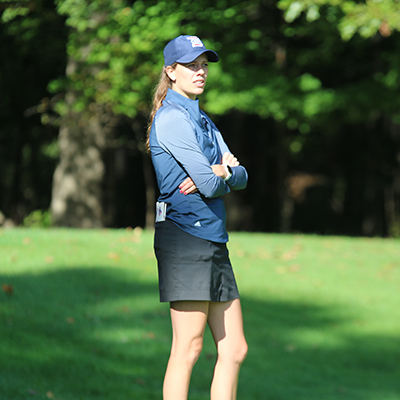 Lindsey Lammers ’14
Lindsey Lammers ’14
Hometown: Milan, Mich.
Major: Business
Position: Head coach
Sport: Women’s golf
Lindsey Lammers starred for the Detroit Mercy women’s golf team as a student-athlete and returned to lead the program less than a decade after graduating. Lammers was a two-time Horizon League Player of the Year and helped the Titans capture two Horizon League championships (2013-14). She was an eight-time medalist, including winning the Horizon League individual crown twice.
Why did you choose Detroit Mercy?
When I met with the coaches and the team, I had a good connection with the girls. It was a place that highlighted and valued education and school. I didn’t have everything figured out, but I knew I could leave here with a respected education. I could compete and play Division I golf and combine that with the education, it was a no-brainer for me.
How was your experience as a student-athlete at Detroit Mercy?
It was a great experience. One, the intimacy that Detroit Mercy had to offer, from an educational standpoint, it was something that I valued. There was an open-door policy in the Athletics Department and with the coaching staff. They were a very successful golf program in those years when I was playing. I loved winning and competing and being part of the winning culture under head coach Terri Ryan. My teammates during my time there are some of my lifelong best friends. I couldn’t owe enough to Detroit Mercy. When you merge the education, my best friends and playing Division I golf and winning a lot, it was the whole package. It was some of the best moments of my life.
How did you get involved in sports? How old were you and what sports did you play?
I grew up a tomboy, I was always around my older brother Nate, who was 5-6 years older and my dad. My brother was an avid golfer at the time. We would go to the range every day after dinner; it was something we did, just the three of us. I had a golf club in my hands at 5 years old. I started competing when I was 10, in some small local golf tournaments. I grew up in golf. I started competing at a young age and it was a very similar story with basketball. I played basketball and golf in high school, as well. I was very competitive-minded and I owe a lot of that to being that tag-a-long sister. I was always around the boys, my brother and his friends and that usually revolved around sports.
Who is a role model that you’ve had in sports?
It’s my father, my dad, Mike. He was also my golf swing coach, throughout high school and college and on the LPGA/Symetra Tour after college. He’s been my right-hand guy in my life, but especially in sports. He was my basketball coach, he would coach our AAU teams, when I was 10, 11, 12-years old. My whole family is very competitive. My mother played basketball in high school. My dad with golf was the guy for me, he’s a great human, and played a pivotal role in my success in basketball and golf. And now we bond over coaching and it’s cool to see the transition with my father and pick his brain on coaching.
How has participating in sports helped shape your life?
Tremendously. I probably can’t say enough how competing and travelling and all of that has impacted my life and who I innately am now. You’re always working toward an end goal in golf. Hit one more bucket of balls and carrying that mindset into corporate America. You’re thinking about the same concepts as a team and competing and carrying that over into your job, which is also very competitive. It can be a grind, but you’re always driving towards an end goal. The traits you learn in college with competing and the mental toughness, such as fighting through an injury. You can’t mimic that anywhere else. I’m forever grateful for being a competitive athlete.
How special is it to lead the team that you used to play for?
I had been missing golf so much after throwing in the towel after competing on the Symetra Tour. I wanted to get back involved with the game in some capacity. I enjoy helping and having an impact on other people, in whatever capacity that is. The head coach job opened up and I actually had been living in Florida, but I moved back for a year and then the job opens up. Talk about timing. It was just meant to be. Now it’s time to carry the reins here and I’m passionate in helping the girls now. I always say, and my girls will probably roll their eyes, get 1% better every day. That’s what it’s all about now.
What do you love about the University?
One thing I really love about it is the sort of intimacy of the classroom and campus. You get your questions answered when you need them. It’s just a big old Detroit Mercy family. It’s smaller, but everyone cares about each other. That was one thing I valued about Detroit Mercy and the University as a whole. You get the Division I experience but a small, family-like feel.
